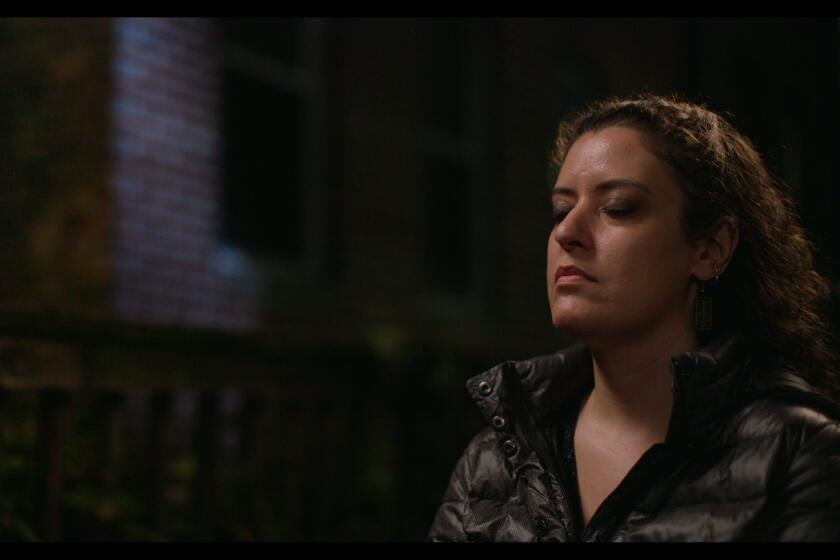Unalloyed Myrna Loy : An independent spirit who survived the gear changes from ingenue to senior character actress, she will get a special Oscar Monday
The movies may be the most dramatic working-out in modern terms of the biblical truth that many are called but few are chosen. Over the decades, there have been who knows how many chorines, ingenues, acting hopefuls of every size, shape and aptitude. But somehow the cameras and the audiences eventually sort out the very few who are special and grant them stardom.
There has probably never been a shortage of redheaded dancers. (Lucille Ball was one.) But out of the crowd, and the bit parts and the silly ingenue turns, the audience and the studio executives (who whatever their failings did know talent and personality when they saw it) decided Myrna Loy was special, as they decided not long after that Ball was special too.
In a fine recent essay on the making of “How Green Was My Valley,” whose script he wrote, Philip Dunne remarks parenthetically about Darryl Zanuck’s skill at casting directors as well as actors. About to film “The Rains Came,” which Dunne also scripted, Zanuck went off the Fox lot to borrow director Clarence Brown from Louis B. Mayer at MGM.
“He told me,” Dunne wrote, “that he wanted Clarence (Garbo’s principal director) to help Myrna Loy (also borrowed from Metro) make the abrupt transition from All-American girls such as her Nora Charles in ‘The Thin Man’ to our decadent and promiscuous Lady Esketh. Not that she needed any help; she took to the naughty lady like a duck to water. Such switches were nothing new to Myrna, a superb actress, born in Helena, Montana, who had served her Hollywood apprenticeship typecast as a sultry Eurasian.”
As a mini-bio, what Dunne wrote can hardly be improved upon. Myrna Williams, later to become Loy, had moved to Culver City at the age of 13 with her widowed mother, having lost her father in the influenza epidemic of 1918.
At 16 she posed as Venus rising from the water for sculptor Harry Winebenner, who taught at Venice High where she was a student. The statue, a target for vandals almost since it was put in place at the school, was once even dynamited and now stands in an iron cage for its own protection.
Already a dancer in Montana, Loy taught dancing in Los Angeles and at 18 did a hitch in the chorus at Grauman’s Chinese, which in those days spaced the silents with a stage show. Actually her role as Lady Esketh was not such a big change in roles. After bit parts, she got her first consequential role playing a mistress in the original 1926 “Ben Hur,” directed by Fred Niblo, with Ramon Navarro and Francis X. Bushman in the more conspicuous roles.
The role may have inspired the geniuses of casting to decide that a Montana redhead would go well as a Eurasian vamp of dubious moral standards. Then again, James Stewart was once screen-tested in a kimono for a role in “The Good Earth.” (He explained later that he was one of the few contract players at Metro who actually looked as if he’d been through a famine.)
But it is hard now not to remember Loy, who will receive a special Academy Award Monday night, as a prototypical middle-class American woman--saucy and liberated as Nora Charles, warm, solid and perfect as Fredric March’s wife in “The Best Years of Our Lives.”
There is in that film a moment when March arrives home from the war and shushes the children to silence as they open the door. We can see Loy, her back to the camera and the door, in the kitchen at the distant end of the corridor in William Wyler’s artfully composed shot. She pauses, sensing March’s unheard presence, turns, sees him and they rush to each other.
It is as emotionally charged a scene as any I can remember--impossible to see again, let alone write about, without a powerful rush of feeling. It is now like a photo in an old family album, a glimpse of a time when things seemed different, simpler and clearer, optimism and idealism a little easier to come by. It is also impossible now to imagine anyone but Myrna Loy in the role--the actress invisible within the specific woman, the waiting wife, the wise mother, she had created.
Now 86, in fragile health, unable to attend the Oscar ceremonies and unwilling to be interviewed at less than her best, Loy retains a remarkable popularity, even among new generations who can only know her from cassettes or late-night television reruns.
She has in fact achieved the hardest Hollywood feat of all: surviving as a performer through all the gear changes from ingenue to senior character actress, from the early roles in such wonderfully titled films as “Beware the Married Men,” “Fancy Baggage” and “Hardboiled Rose” to playing Paul Newman’s mother in “From the Terrace” in 1960.
John Dillinger was watching her in 1934, along with William Powell and Clark Gable, in “Manhattan Melodrama” at the Biograph Theatre in Chicago, from whence he emerged to meet the G-men and eternity.
That was the same year “The Thin Man” was released, elevating her to superstar and engendering five sequels.
From the start, Myrna Loy has been identifiable as an independent spirit, which has endeared her to women and men alike, and most especially to other actresses, for whom she has been a role model and an inspiration. She has fought for good and sometimes unpopular causes, inveighing against Sen. Joseph McCarthy and campaigning for civil rights, Adlai Stevenson and Sen. Eugene McCarthy.
Her four-husband private life has not been a secret, exactly, but it has been conducted with the kind of discretion and taste that has marked her work as well.
The possibilities of the movies have been defined in executive suites and on the stages, by creators behind the cameras and before them, and Myrna Loy has been one of the medium’s most engaging definers.
More to Read
Only good movies
Get the Indie Focus newsletter, Mark Olsen's weekly guide to the world of cinema.
You may occasionally receive promotional content from the Los Angeles Times.










